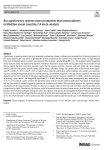Scordia D., Corinzia S.A., Coello J., Vilaplana Ventura R., Jiménez-De-Santiago D.E., Singla Just B., Castaño-Sánchez O., Casas Arcarons C., Tchamitchian M., Garreau L., Emran M., Mohamed S.Z., Khedr M., Rashad M., Lorilla R.S., Parizel A., Mancini G., Iurato A., Ponsa S., Dimauro C., Gresta F., Cosentino S.L., Testa G. (2023). Are agroforestry systems more productive than monocultures in Mediterranean countries? A meta-analysis. Agronomy for Sustainable Development, 01/12/2023, vol. 43, n. 6, p. 73.
https://doi.org/10.1007/s13593-023-00927-3
https://doi.org/10.1007/s13593-023-00927-3
| Titre : | Are agroforestry systems more productive than monocultures in Mediterranean countries? A meta-analysis (2023) |
| Auteurs : | D. Scordia ; S.A. Corinzia ; J. Coello ; R. Vilaplana Ventura ; D.E. Jiménez-De-Santiago ; B. Singla Just ; O. Castaño-Sánchez ; C. Casas Arcarons ; M. Tchamitchian ; L. Garreau ; M. Emran ; S.Z. Mohamed ; M. Khedr ; M. Rashad ; R.S. Lorilla ; A. Parizel ; G. Mancini ; A. Iurato ; S. Ponsa ; C. Dimauro ; F. Gresta ; S.L. Cosentino ; G. Testa |
| Type de document : | Article |
| Dans : | Agronomy for Sustainable Development (vol. 43, n. 6, December 2023) |
| Article en page(s) : | p. 73 |
| Langues : | Anglais |
| Langues du résumé : | Anglais |
| Catégories : |
Catégories principales 06 - AGRICULTURE. FORÊTS. PÊCHES ; 6.4 - Production Agricole. Système de ProductionThésaurus IAMM SYSTEME DE PRODUCTION ; AGROFORESTERIE ; MONOCULTURE ; RENDEMENT ; RENDEMENT DES CULTURES ; PRODUCTION ; REGION MEDITERRANEENNE |
| Résumé : | Agroforestry is gaining interest due to its potential in enhancing climate resilience and sustainability of farming systems. In this meta-analysis, the crop yield in agroforestry system compared to the control (sole crop) from thirty-six experimental field trials in Mediterranean countries was assessed. The response variable Wlog(RR) (i.e., the weighted natural logarithm of the response ratio) was analyzed by the 95% confidence intervals of mean and by fitting eight linear mixed models. Fixed effects, namely the tree cover (low, medium, high), the tree species (ash tree, chestnut, cork oak, holm oak, olive, poplar, walnut), and the crop species (alfalfa, barley, durum wheat, faba bean, forage, oat, pasture, pea, winter wheat) were significant (P = 0.030, P = 0.017, and P = 0.014, respectively), while the system type (alley cropping, silvo-arable, silvo-pastoral) was not. Among management practices (variety, pruning, fertilization, irrigation, crop age classes, imposed warming and drought, harvest time), only the fertilization significantly improved the response variable (P = 0.006), while the interaction of pruning * crop species was marginally significant (P = 0.065). Relatively large study heterogeneity was observed (Q = 72.6, I2 = 72%), which is quite common for agronomic meta-analysis. On the contrary, publication bias based on funnel plots and the Trim and Fill method suggested symmetrical distribution of studies. The sensitivity analysis for significant models identified room for improvements. Overall, we observed a negative effect of trees on crop yield that could be ascribed to the competition for light. Nonetheless, facilitation could be expected under extreme climate events, provided that agricultural practices will maximize synergies among tree cover, tree species, crop species, and management. Future works are encouraged to focus on the overall benefit agroforestry can provide at the field and landscape level, along with long-term monitoring to assess the whole lifespan of these systems and other companion planting options and designs in the Mediterranean region. |
| Cote : | En ligne |
| URL / DOI : | https://doi.org/10.1007/s13593-023-00927-3 |







